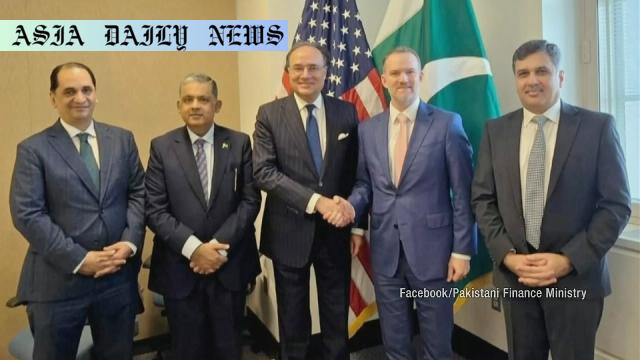Trade Agreement: The United States and Pakistan announce finalized trade negotiations, with lowered tariffs and energy cooperation.
The deal lowers US tariffs on Pakistani exports while enhancing bilateral trade.
The agreement promotes collaboration on Pakistan’s energy reserves development.
It follows Trump’s 29% tariff imposition in April, resolved through negotiations.
Pakistan sees the deal as a turning point for cooperation and economic benefits.

Introduction to the Historic Trade Agreement
The trade agreement between the United States and Pakistan marks a significant milestone in diplomatic and economic relations. Announced earlier this week, the agreement seeks to lower tariffs on Pakistani exports and deepen cooperation in the energy sector. As President Donald Trump disclosed, this new partnership also includes plans to develop Pakistan’s oil reserves, further strengthening the economic ties between the two nations. Finance Ministry statements from Pakistan highlighted this as an opportunity for expanded market access and bilateral trade, key factors believed to benefit their national economy extensively.
Addressing Tariff Challenges and Promoting Bilateral Trade
In April 2023, the United States imposed a 29% tariff on Pakistani imports, significantly impacting trade volumes between the two countries. This latest agreement is a result of extensive negotiations aimed at resolving these tensions. According to Pakistan’s Finance Ministry, the tariff reductions, while not explicitly quantified, are expected to create a conducive environment for exporters and industries to thrive. The emphasis on “boosting bilateral trade” further positions this agreement as a driver of economic growth and a symbol of growing collaboration between two countries that are strategically aligned yet historically challenged by diplomatic hurdles.
Energy Cooperation: A Bold Step Forward
Perhaps the most noteworthy aspect of the agreement is its focus on energy collaboration. As per President Trump’s statement, an international oil company will soon spearhead a partnership to explore and develop Pakistan’s oil reserves. This aligns with Pakistan’s long-term energy security goals, while also opening the doors to American energy expertise and investment. Enhanced cooperation in energy development not only signifies economic partnerships but also reflects the efforts to address Pakistan’s energy crisis, which has plagued the country for decades.
Implications for Pakistan’s Economy and Global Relations
The “landmark deal,” as described by Pakistani Prime Minister Shehbaz Sharif, has immediate and long-term advantages. Lower tariffs directly support export-driven industries such as textiles, thereby increasing competitiveness in US markets. Additionally, energy sector development ensures job creation, technological transfers, and foreign direct investment, boosting Pakistan’s volatile economy. On the global stage, this deal enhances Pakistan’s economic profile, fostering stronger relationships not only with the United States but also with other trading nations observing this development closely.
The Path Ahead
While the agreement provides a much-needed breakthrough, challenges remain. Implementation details, transparency over tariff levels, and the selection of an oil company to lead energy development are key steps that hold critical importance. Pakistan must also navigate concerns surrounding political stability and regulatory framework reform to maximize the benefits of this agreement. By addressing these challenges effectively, the US-Pakistan trade agreement may well become a template for future bilateral partnerships, paving the way for sustainable economic growth and strengthened alliances.
Commentary
Renewed Economic Partnerships
The US-Pakistan trade agreement represents a refreshing step towards revitalizing economic partnerships between the two nations. At a time when international trade is under significant strain due to geopolitical tensions and economic instabilities, an agreement of such magnitude signals hope and determination on both sides. It’s rare to see bipartisan cooperation align so effectively with economic action, yet this deal effectively sets that precedence.
Opportunities in Energy Collaboration
The emphasis on energy development stands out as a bold and visionary element of the agreement. Pakistan’s oil reserves present a largely untapped resource with immense economic potential, and US expertise in drilling technologies could revolutionize the country’s energy sector. However, collaboration in such a sensitive domain also brings challenges concerning resource allocation, revenue sharing, and environmental regulations that must be navigated carefully to ensure mutual benefit and sustainable development.
Broader Impacts on Bilateral Relations
Beyond immediate economic considerations, this agreement could herald a new era of trust and mutual respect in US-Pakistan relations. Historically marked by fluctuating alliances, this deal allows both sides to demonstrate goodwill through collaborative actions. For Pakistan, it is an opportunity to improve its standing as a credible trade partner, while for the US, it showcases strategic investments in a region of increasing geopolitical interest.
Challenges to Execution
Notwithstanding its potential benefits, the trade deal raises questions regarding execution. Pakistan must focus on enhancing its regulatory frameworks to attract and sustain foreign investments. Additionally, ensuring transparent mechanisms during tariff reduction implementations will be critical to maintaining economic trust between the nations. Any missteps could undermine the ambitious goals set by this landmark pact.
Conclusion
In the grand scheme, the US-Pakistan trade agreement is a positive step toward fostering better economic and political ties. While its success depends on the effective realization of proposed benefits, the deal embodies a significant moment for both nations—one that may shape the trajectory of future diplomatic and economic engagements. Observers globally will be keenly watching how this renewed partnership unfolds.


